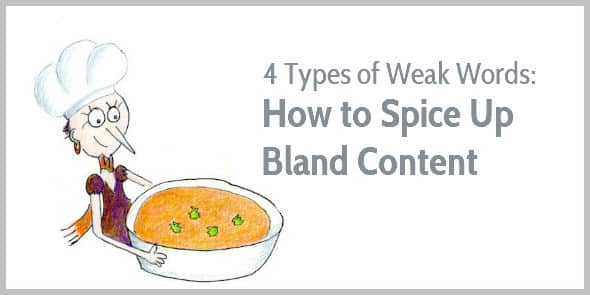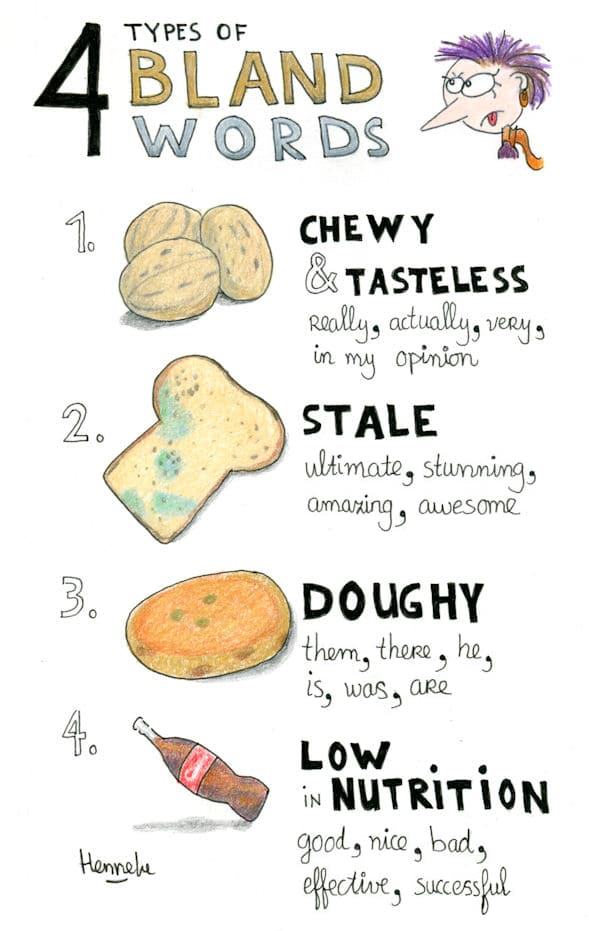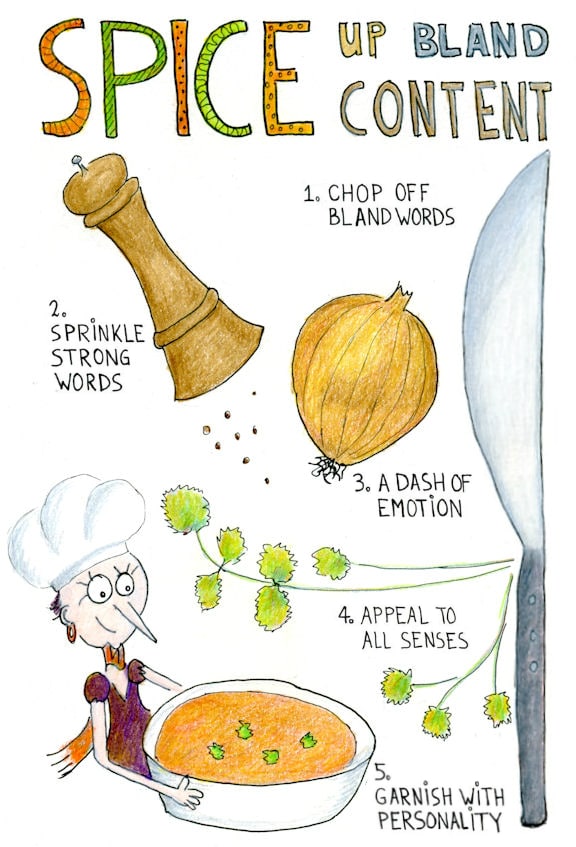Weak Words To Avoid In Writing

It can happen to everyone.
Sweating and shivering, you've written your first draft. Your shoulders feel tense. A headache is coming up.
But you know this is good.
You pour yourself a glass of wine, before going to bed. Editing is for tomorrow.
But when you read your draft again …
You feel disappointed. Your writing sounds bland. You can't publish it like this.
What happened?
Have weak phrases sneaked into your writing?
They always do. Even the most experienced writers have to stay vigilant; and edit their drafts with a sharp knife and a selection of spices.
Turning bland text into sizzling content may sound difficult, but it requires only two simple steps:
- Like a chef tastes a dish before serving, you need to know when your content lacks flavor. You have to spot weak phrases.
- And just like a chef grinds a little extra pepper, sprinkles a few coriander leaves, or drizzles extra lime juice, you need to balance the flavors of your writing, too.
Sounds complicated?
It really isn't.
Let's start with spotting bland words first. And then, I tell you how to add more flavor to your writing. Okay?

4 must-know types of weak words
Type 1: Chewy and tasteless
Like pineapple peel or walnut husk, you don't want these words to turn up in your content. They slow down your reader without adding meaning. Chopping off is the best advice.
Examples:
Very, actual, in my opinion, really, just
Type 2: Stale words
At one time these words were strong and powerful. But over time, they've lost their meaning—like stale bread.
Examples:
Ultimate, stunning, amazing, wonderful
Type 3: Doughy words
These words have some taste, but aren't flavorsome. In moderation, they're okay, but use them too often and you get a pizza with a doughy crust and no toppings. The cook's advice is to use with care.
Examples:
Them, it, there, he, and other pronouns
Is, are, was and other forms of to be
Type 4: Words with low nutritional value
A coke quenches your thirst and appears to give energy, but its nutritional value is low. A fruit smoothie sounds healthy, but may have a ton of added sweeteners.
Words with low nutritional value are similar. They seem to have a meaning, but their meaning is weak. For instance: What is a good blog post? Do you mean it's entertaining, engaging, or useful?
Or how do you define a successful business woman? Does she have a six-figure income? Oodles of leisure time? Or does she inspire you and make the world a better place?
Words like good and successful are problematic because they can be interpreted in many different ways—they're not specific enough.
More examples:
Nice, bad, effective
How to Add Flavor to Your Words
To spice up your content, remove chewy words and add stronger flavors:
- Use stronger or more precise words
- Add a dash of emotion
- Appeal to all senses
- Garnish with personality

Let's look at some examples of flavoring bland content, shall we?
Example 1
There was a crazy Dutch girl who wrote our sales copy.
Weak word: there (doughy)
Cook's advice: chop off and rewrite
Tastier option:
A crazy Dutch girl wrote our sales copy.
Example 2
The Ultimate Guide to Developing a Writing Habit
Weak word: Ultimate (stale)
Cook's advice: Be a little creative—garnish with personality
Tastier options:
A Lazy Girl's Guide to Developing a Writing Habit
A Dilly-Dallier's Guide to Sticking to a Writing Habit
Example 3
In my opinion, this blog post is pretty good.
Weak phrases: in my opinion (chewy) and pretty good (low nutritional value)
Cook's advice: chop off the chewy phrase and add flavor
More flavorsome options:
This blog post is entertaining and useful for anyone who writes.
This blog post blew my mind. I've never read such a fun tutorial before.
This blog post was so scrumptious, I gobbled it up, and craved more.
Example 4
She was writing her blog post on Sunday.
Weak words: was, she, her (doughy)
Cook's advice: chop off and rewrite
Tastier option:
Henrietta illustrated her writing recipe on Saturday. She wrote her blog post on Sunday.
Note:
In the second sentence, the word she is fine, because you know it refers back to Henrietta. When you use a word like it, she, or them, always ensure you've told the reader already what or whom you're writing about.
How to Make Stale Content Sizzle and Shine
When a cook develops a new recipe, she doesn't know exactly how many spices to add. How many drops of lime juice? How many spoons of fish sauce? Coriander leaves? Chili pepper? A hint of ginger?
To find the perfect balance of flavors, she tastes, adds spices, and tastes again.
With writing, it's the same.
Read your content aloud. Hear how it sounds and spot the bland phrases.
Sprinkle with your favorite words. Try a few exotic spices. Stir and taste again.
To create your signature dish, experiment with different flavors until you're happy.
Enjoy!
Weak Words To Avoid In Writing
Source: https://www.enchantingmarketing.com/weak-words/
Posted by: crumbleywhastood.blogspot.com

0 Response to "Weak Words To Avoid In Writing"
Post a Comment